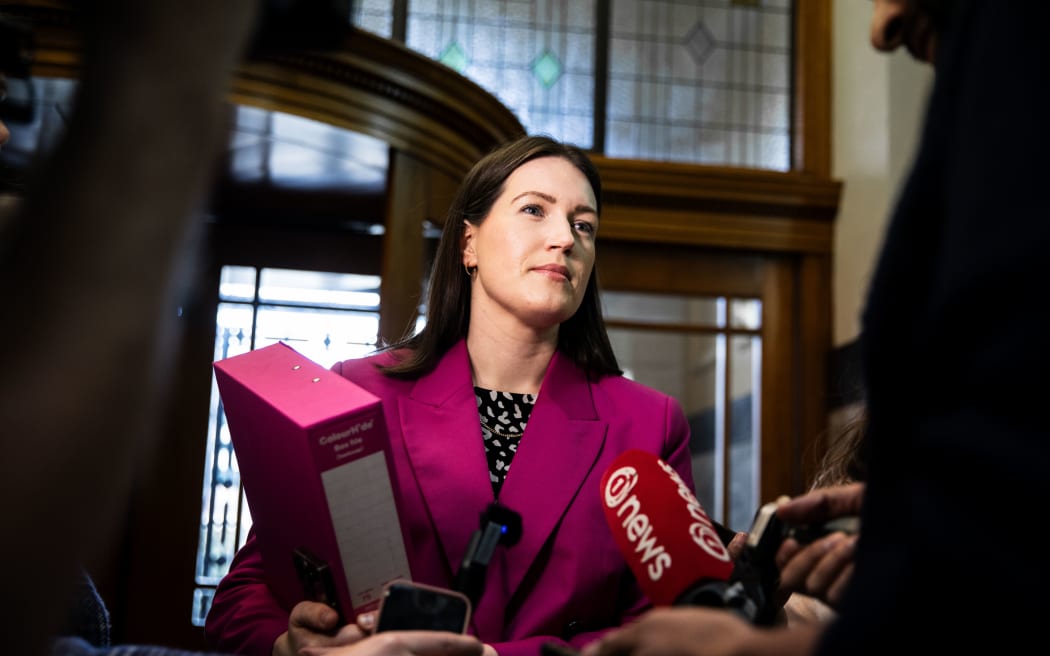
Photo: RNZ / Samuel Rillstone
With more than 70 workplace deaths in New Zealand every year, a WorkSafe reboot isn't surprising. But critics say the changes aren't likely to save lives.
WorkSafe is being urged to soften its tone, sharpen its focus, and become an enabler of safe work, not just an enforcer of compliance, as part of significant changes to New Zealand's health and safety regime.
Under direction from Workplace Relations and Safety Minister Brooke van Velden, the regulator is undergoing something of a transformation to prioritise education over punishment, and trust over fear.
"There is a huge culture of fear around our regulator for health and safety; this needs to change," van Velden told Q+A with Jack Tame. "We have to focus on reducing death and serious injuries before we sweat the small stuff."
She says while enforcement remains on the table for serious breaches and dangerous workplaces, engagement and guidance will be the dominant force going forward.
But not everyone is convinced this is the right move.
Journalist and author Rebecca Macfie, who has written extensively about workplace failures, tells The Detail there is no benefit in watering down enforcement in a country where workplace deaths remain stubbornly high.
On average, 73 people die in a New Zealand workplace every year.
"My instinct is no, the changes won't [save lives]," says Macfie. "It is missing so many critical parts of what a good system would look like. Most importantly, it is absolutely missing the place of workers and worker voice."
Macfie authored a book on the deadly Pike River Mine explosion, a tragedy that killed 29 workers and led to the creation of WorkSafe in 2013 and a major overhaul of health and safety law in 2015.
"I have written and covered so many stories about [workplace deaths], they keep on happening, we keep on killing 70-plus workers a year in this country, and nobody can be satisfied with that, so change and improvement are drastically needed.
"But my response to van Velden's changes is they are not getting to the kind of change that is actually needed.
"On one hand, she wants to dial back on enforcement against businesses and increase guidance. The increased guidance is good, but the dialling back of enforcement is not.
"And there is inconsistency... she wants to see more prosecutions of workers."
"She also wants to reduce the obligations on directors.
"That seems pretty brazenly inconsistent to me," Macfie says.
"The bottom line is, the minister now wants WorkSafe to go gently, be more supportive, and be prepared to help. On one level, this is fine, but we need serious enforcement as well."
Newsroom political editor Laura Walters tells The Detail that the changes are on brand for ACT.
"This is an important area for ACT, in terms of workplace relations, employment relations, negotiations, workplace settings ... this is important for ACT around reducing - in their words - unnecessary red tape, reducing intervention from government and letting people get on with business and try and lift productivity... this is core ACT stuff.
"It's hard to know if this will be a win for ACT until we see the effect of the changes... the biggest test is obviously election time.
"But you will imagine this will be welcomed by businesses... they have been asking for this kind of change, so they will be happy.
"But will it reduce deaths in the workplace?
"Right now, that is too hard to know."
The reforms follow months of internal and external reviews of WorkSafe's effectiveness, capacity, and culture. Minister van Velden says WorkSafe must now be a coach, not just a cop.
Check out how to listen to and follow The Detail here.
You can also stay up-to-date by liking us on Facebook or following us on Twitter.


